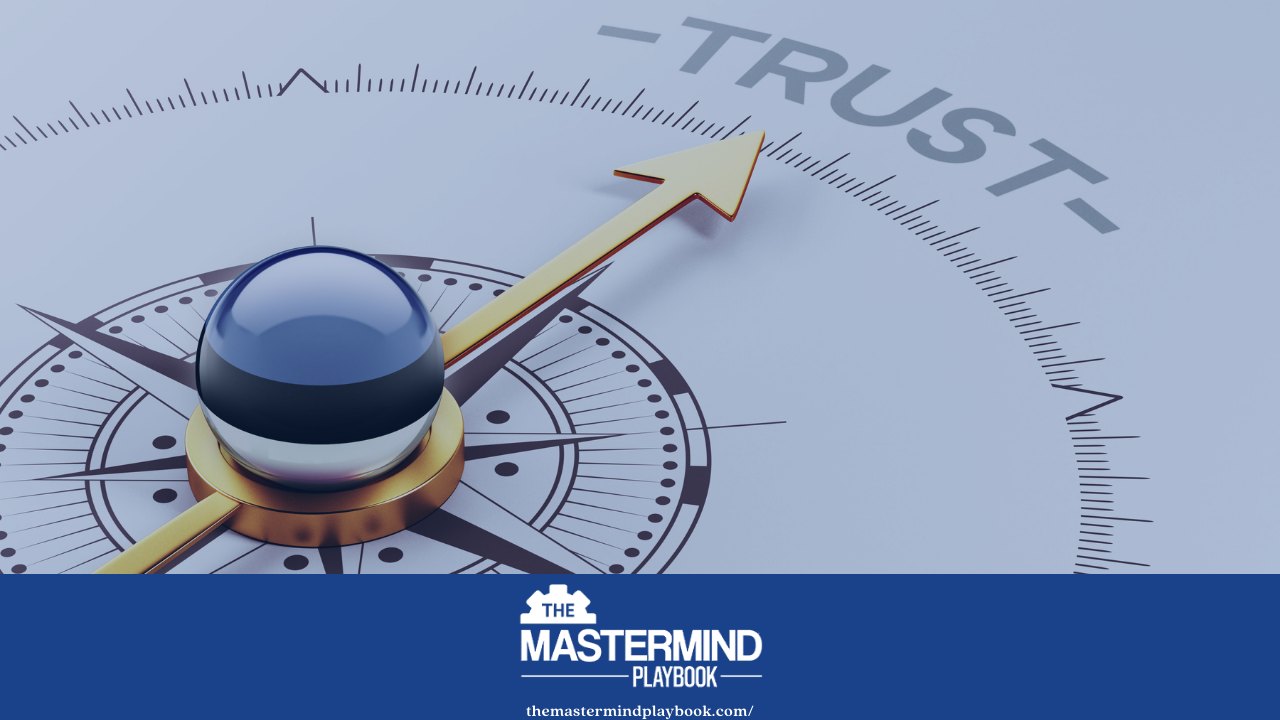3 Keys For Mastermind Leaders to Develop Self-Trust

In The Speed of Trust, Stephen M.R. Covey argues that businesses and organizations can only move at the rate equal to their members’ trust in each other—and themselves.
I reckon, he’s correct!
I’ve had the misfortune of working in organizations that had low trust. Sometimes colleagues didn’t trust one another due to fierce competition and unbalanced incentives. Other times, there was low trust between managers and subordinates due to harsh micromanagement—or a lack of strong guidance.
In these environments, everyone watches their own back. And all that time looking backward means we had no time to look—and move—forward.
Therefore, any organization that desires to see its vision fulfilled has to work on its trust. This trust tends to flow from the top down rather than the bottom up, because of the natural balance of power between executives, managers, and employees.
This is especially true of mastermind groups which are known for their big vision and vulnerability of expression between the members. You need to trust your members, and they need to trust you and the others. Otherwise, what’s the point of collaborating?
Covey argues that trust at the organizational and team level first requires the leader to trust themselves, and I couldn’t agree more.
Check out The Mastermind Playbook for more on the fundamentals of building trust in an organization or mastermind group.
Self-Trust Will Only Benefit Your Mastermind
At a very basic level, you can’t fully trust others until you learn to trust yourself. And thankfully, everyone has the potential to grow in their self-trust.
As you develop self-trust, it teaches your members to trust themselves, too. When you put a dozen confident people who trust themselves into a room, trust between the members develops very quickly. As a mastermind leader, you want every member to become a more mature, more fully realized version of themselves.
From there, the group benefits. Members are honest with themselves and honest to the members of the group about their goals, strategy, vision, and results. Working through solutions turns into a process of harmonious collaboration instead of a competition.
Soon enough, you’ll see your group moving forward at the speed of trust!
For more help building a high-trust mastermind, check out The Mastermind Playbook.
Three Principles For A Self-Trust Growth Spurt
If you follow these three principles, you’ll develop trust in yourself, to the benefit of your family, colleagues, and mastermind:
- Integrity & Intent
First of all, the key to self-trust is personal follow through. You’ve heard the adage that in relationships, trust is earned, not given? Well, you have to earn it with yourself, too. Some people have very low self-trust because they don’t live up to the commitments they make to themselves.
These lapses can be small, like failing to get up on time and work out like we said we would. They can also be huge, like falling through on business deals or not coming through as a spouse. To counter this, we all need more integrity. Integrity makes it easier to develop trust in yourself because frankly, it makes you a more trustworthy person.
Intent is similar. Clarifying your intentions means distinguishing what you truly WANT out of different situations and behaviors. You begin to understand your core motivations.
All of us have mixed motivations—that’s part of being human. Getting in the habit of consistently monitoring our intentions and then modifying our behavior when we realize we have the wrong intent is key.
- Capabilities
Once you understand the importance of personal followthrough and analyzing your intentions, it’s time to begin working on your capabilities.
Self-efficacy involves your beliefs about your abilities. Do you believe you have the capability necessary to do the tasks you put yourself up to? Notice that it has to do with your beliefs and mindset, not your actual performance.
Counterintuitively, when your self-efficacy improves, your performance tends to improve just as much. That’s right, simply believing you can achieve a goal boosts your ability to reach the goal.
Do you trust your own capabilities? If not, you need to set up small, easy wins for yourself. From getting up on time to staying on the job just a little bit longer, small victories give incremental increases to self-efficacy, enabling you to believe in yourself more and thus achieve more.
- Results
Lastly, you need to track your results to build trust in yourself. Think of it this way—you’re in a courtroom, tasked with proving your trustworthiness to a jury—who are also all you.
To convince the jury, you need to present tangible evidence that will sway them. They need to look at objective facts, so their decision isn’t based on emotion but on logic.
Your argument could go a little bit like this: “Here’s exhibit A on why I can trust myself—I got up on time seven out of seven mornings this week. Here’s exhibit B: I generated $6,000 in revenue, just like I said I would.”
To build your trust in yourself through results, determine the kind of metrics you want to track, the goals you want to hit, and then hit them. These should be “input” goals like 100 cold emails sent, and also “output” goals like 10 clients closed. In the former, it’s all about the effort you make, while the latter reflects the outcome.
Personal follow through. Intentions. Self-Efficacy. Tracking goals. If you put in the effort to make these a regular part of your leadership, you’ll grow to trust yourself. From there, the growth of the members of your mastermind will skyrocket, thanks to your influence on them.
Check out The Mastermind Playbook for more perspectives on the power of self-trust for mastermind leaders.

